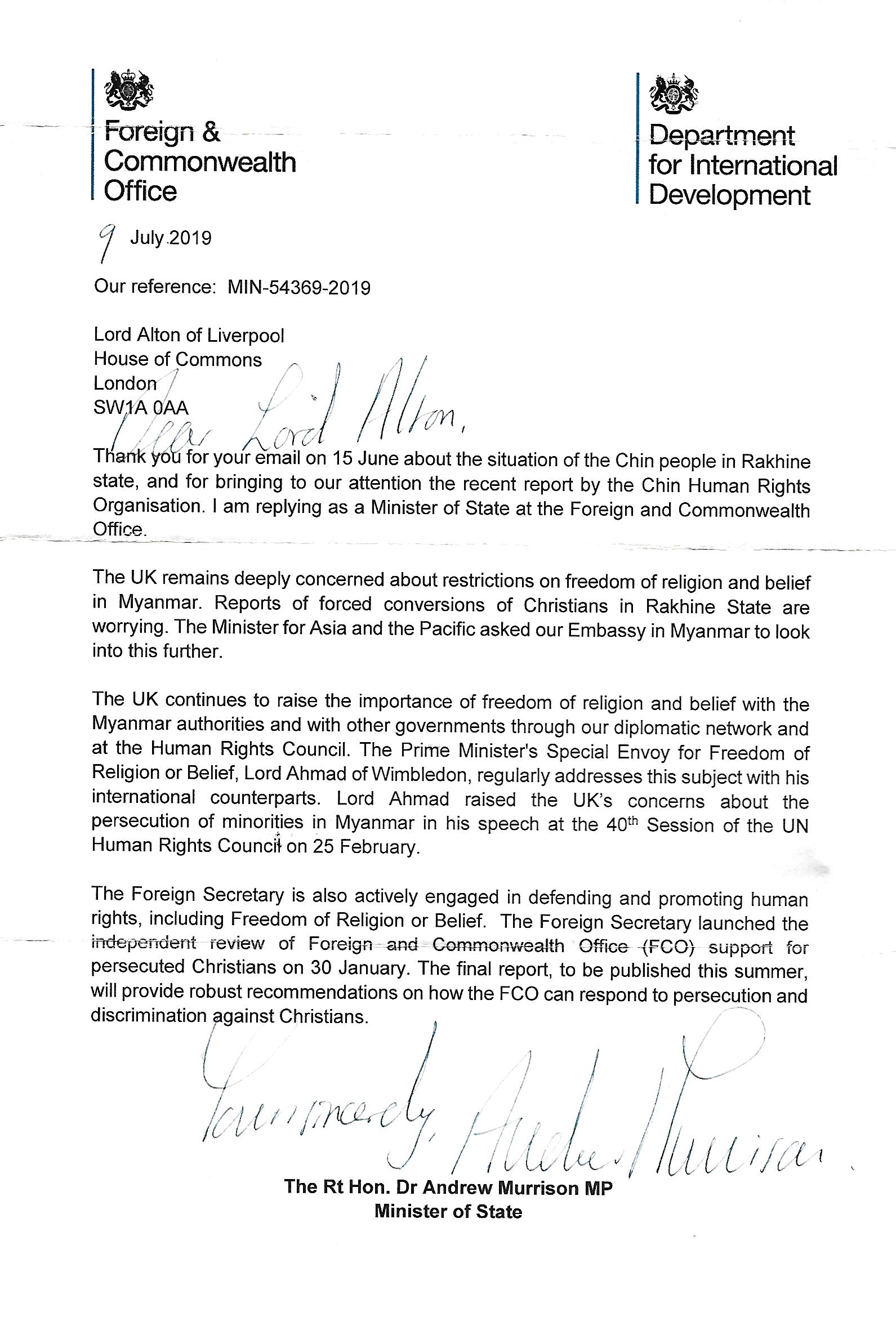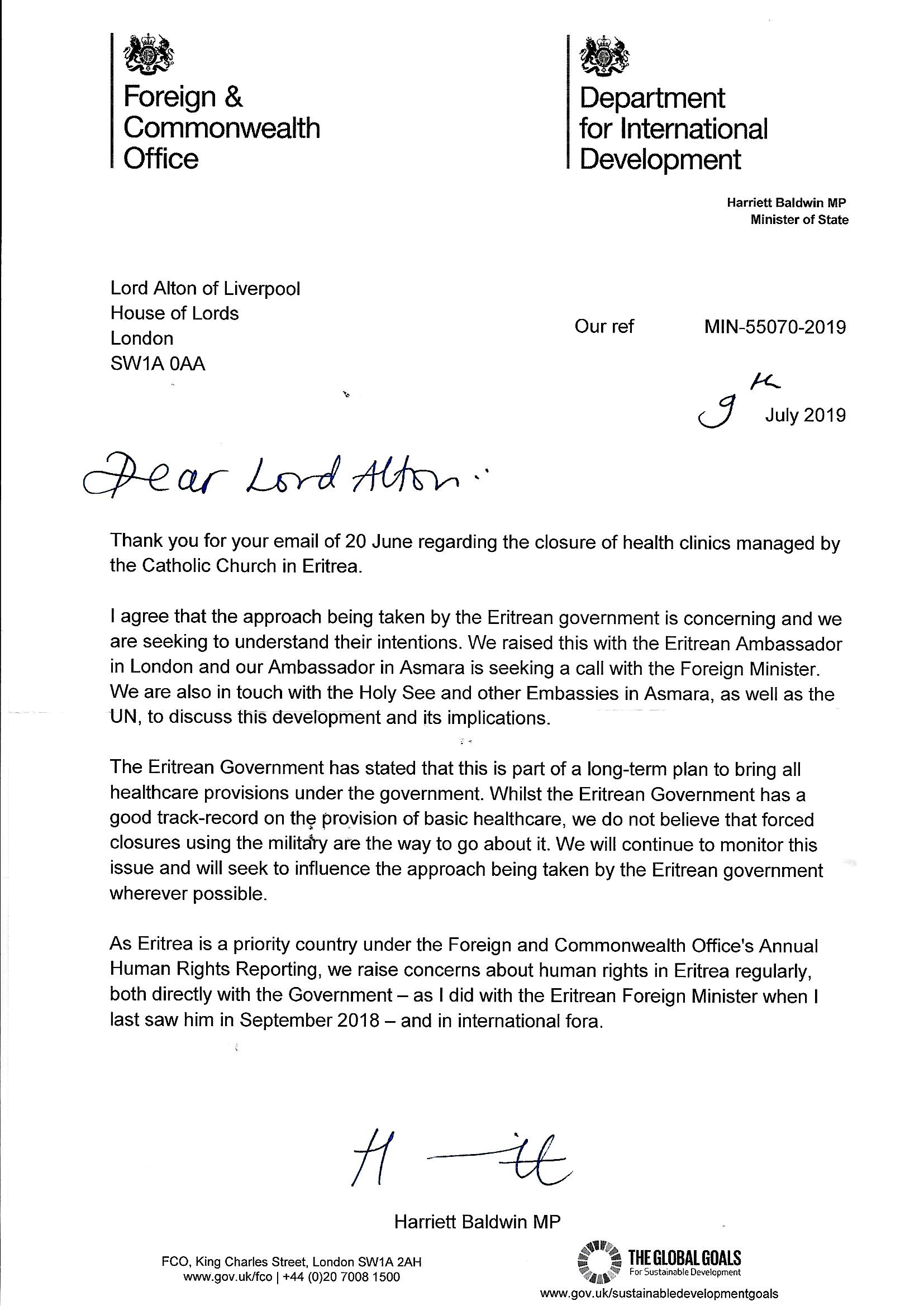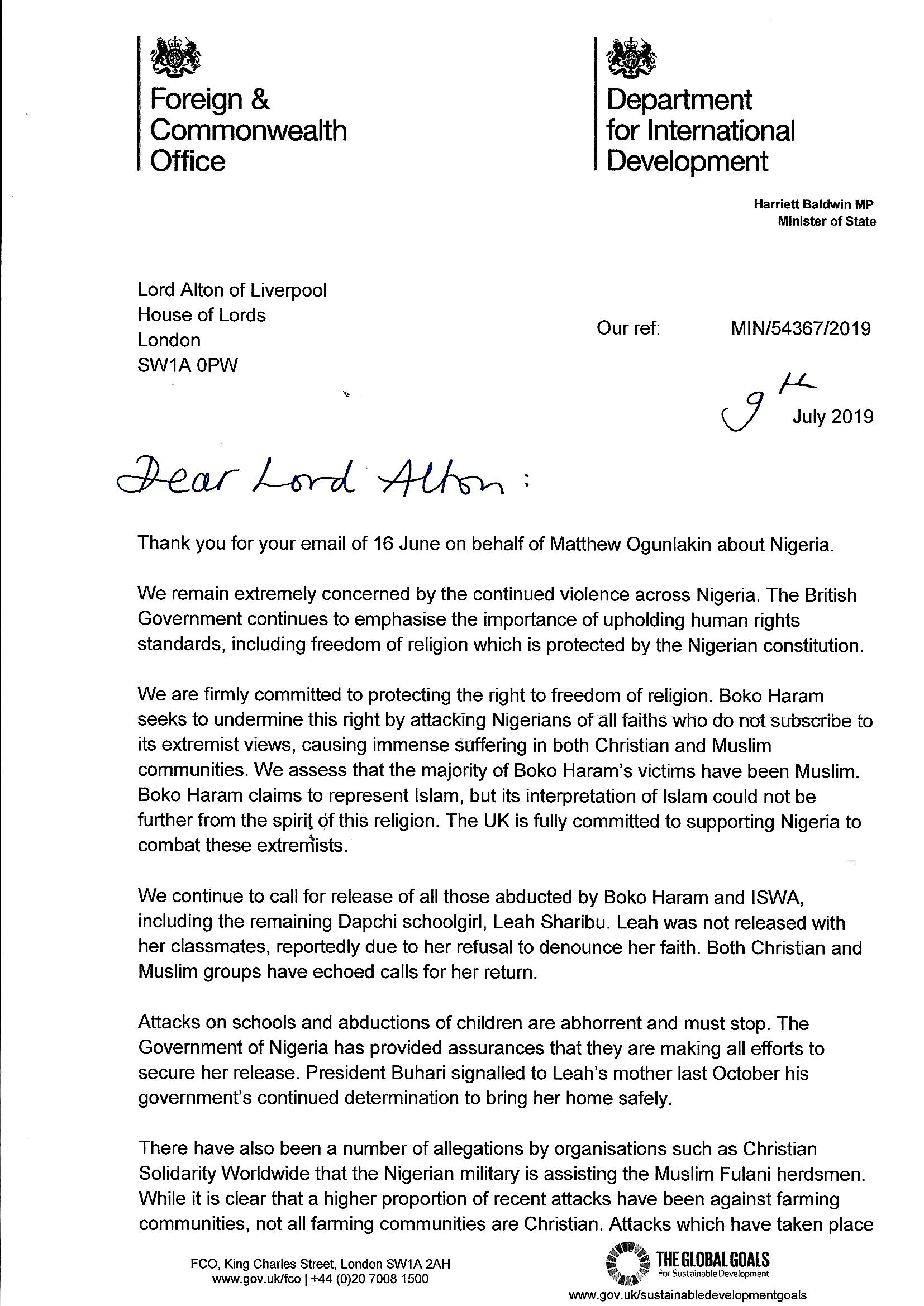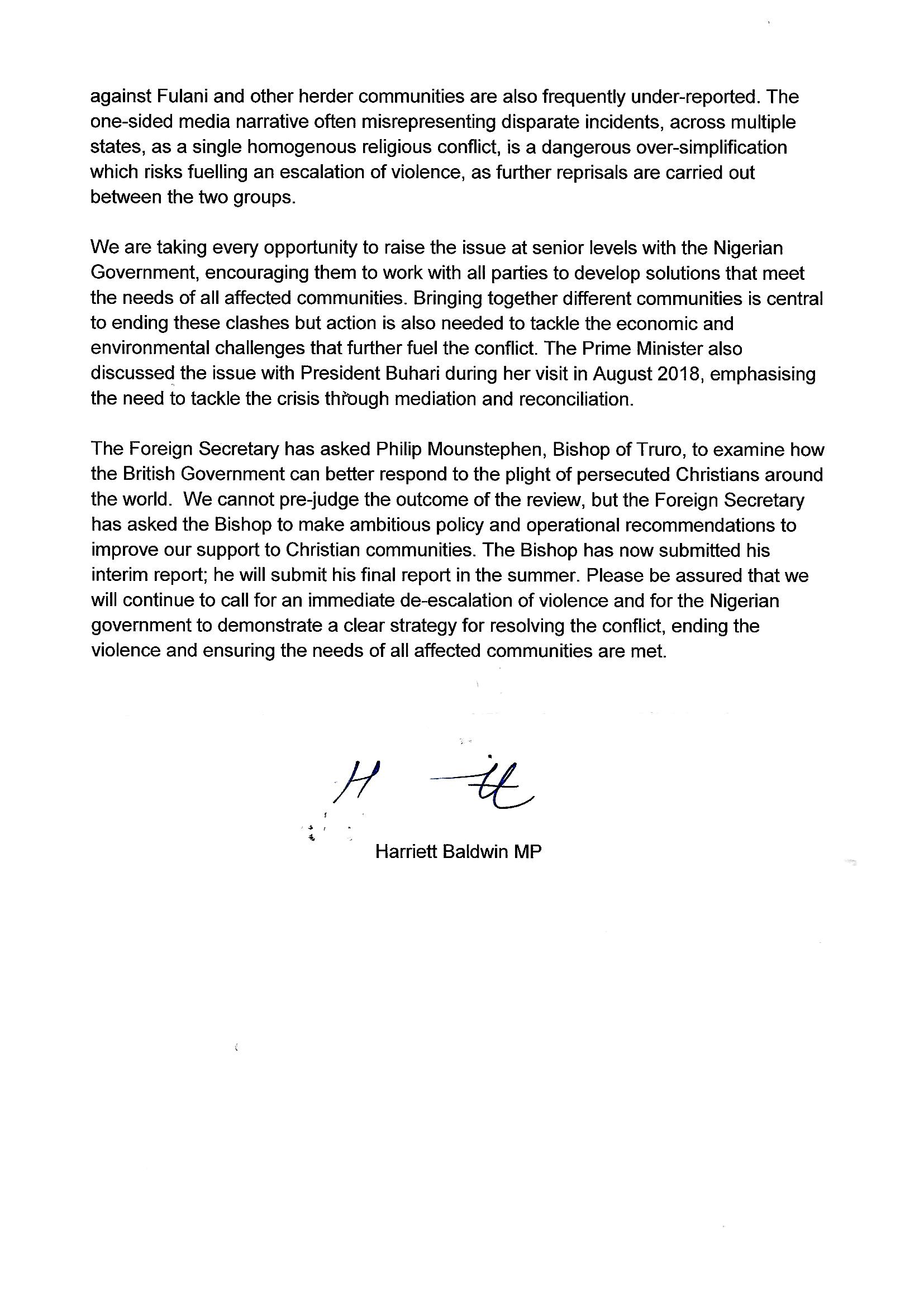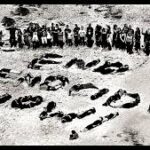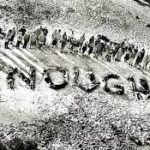https://www.parliamentlive.tv/Event/Index/e4c8e594-c6d2-4880-952b-9ac5a01c15fe#player-tabs
3.10 pm July 11th 2019
Lord Alton of Liverpool (CB)
My Lords, the noble Lord, Lord Elton, has provided the House with this perfectly timed debate, coming as it does in the week in which the independent report to the Foreign Secretary concluded that the persecution of 250 million Christians comprises the,
“most shocking abuses of human rights in the modern era”.
Many others, believers and non-believers, suffer too. Jeremy Hunt is to be congratulated for commissioning the report, and Bishop Mounstephen, Bishop of Truro, and his admirable team on producing such robust, evidence-based findings.
I was particularly struck that the Truro report highlights the failure to declare as a genocide the murder of Christians and Yazidis in Iraq and Syria, and it goes on to forensically analyse, country by country, the UK’s response.
Departmental institutional weaknesses notwith-standing, like the noble Lord, Lord Anderson, I place on record my admiration for the work of the noble Lord, Lord Ahmad of Wimbledon, in tirelessly championing Article 18 commitments to freedom of religion or belief and the new United Nations day on religious freedom, which is being commemorated in your Lordships’ House on 23 July.
In recommendations 15 to 19 and 21, the report spells out why all government departments need to collaborate in prioritising this issue, and they should note that both Jeremy Hunt and Boris Johnson have said that they will act on the report’s recommendations. However, the report has sent half an unfinished message on one fundamental issue: genocide.
Over the last 19 years, on 300 separate occasions I have referred to genocide prevention and prosecution, beginning in 2000, after seeing first hand what the Burmese military had done in Karen state. In 2000, it was the Christian Karen.
Today it is the Muslim Rohingya and Christian Kachin. From Burma to North Korea and Darfur, from China’s Uighur Muslims to Nigeria’s beleaguered Christians, from Pakistan’s Hindu, Christian, Ahmadi and Kalash minorities to Syria and Iraq’s Yazidis and Christians, the story is the same. Ignore discrimination and tolerate persecution and crimes against humanity, and genocide is never very far behind.
In 1915 a slow-burn genocide, still unrecognised by the Foreign and Commonwealth Office for political reasons, took the lives of 1.5 million Armenian Christians. Hitler took the world’s indifference to the slaughter of the Armenians as a signal that he could butcher Jews, disabled people, gypsies, homosexuals, Roma and non- compliant religious minorities, famously saying,
“Who now remembers the Armenians?”.
As the Truro report notes, just over a century ago, Christians constituted 20% of the Middle East’s population. Today it is below 5%. It began with the Armenians but it did not end there. A student of those events, the Jewish lawyer Raphael Lemkin, 49 of whose relatives were murdered in the Holocaust, coined the word genocide, and the United Kingdom signed up to the genocide convention which he helped develop, and which requires us to prevent, protect and punish.
As the Truro report reminds us, the killing begins when we ignore the “canary in the mine”; it emboldens the perpetrators into believing that we are too weak or too disinterested to ever hold them to account. It is a green light to the world’s tyrants, lawless militias, totalitarian regimes and hate-filled ideologues, who despise difference and believe that minorities are a curse, not a blessing.
The beginning of 2014 saw the commencement of a new wave of mass beheadings of “infidels”. People were thrown from high buildings, prisoners burned in metal cages, women raped and homes looted. These atrocities then intensified in their number and scope. On 3 August 2014, ISIS attacked Sinjar, killing thousands of Yazidis, abducting thousands of women and girls, and forcing the rest to flee.
This attack on the Yazidis was followed by subsequent mass atrocities in the Nineveh Plains, where Christians were forced to flee or die. ISIS was responsible for murder, enslavement, deportation, the forcible transfer of populations, exploitation, abuse, abductions of women and children, forced marriage and enforced disappearances. Christian homes and shops were looted after being daubed in Arabic with the letter N, for Nazarene. Churches were destroyed.
In every sense, these atrocities perpetrated against religious minorities are crimes against humanity and genocide, but to date, the UK Government have still failed to name these crimes for what they are. The Truro report notes that although the House of Commons, the United States Administration, the European Parliament and many other parliaments have said that these events,
“constitute a genocide according to the established UN criteria, this has not been recognized by the UK Government”.
None the less, says the Truro report,
“the evidence from Syria certainly suggests that the UK government should examine its historic unwillingness to deal with the issue of genocide determination and be prepared to make a prima facie assessment as to whether genocide has been committed, whilst still safeguarding its long-held principle that the ultimate determination must be legal not political”.
This is a fundamental question.
It is why I have argued that there needs to be a judicial mechanism free of political interference. The FCO should act at least on the recommendation to examine this “historic unwillingness”. I hope that the Minister, whom I questioned about this during Oral Questions yesterday, will give us some assurance that that will happen. After all, this is the crime above all crimes, and the FCO should separate itself from genocide determination and put in place independent legal mechanisms that work.
In 2017, through Resolution 2379, the UK successfully persuaded the Security Council to collect evidence of these appalling crimes and of the mass graves. The FCO deserves credit for that. But the Security Council has failed to establish a mechanism to create ad hoc tribunals to try those responsible. We should now work with our allies—if necessary outside the Security Council—to create such a mechanism. What is the point of collecting evidence if we do not do anything about it? The alternative is to allow mass murderers to grow old, unpunished.
I will give one other example from the Truro report. I co-chair the All-Party Parliamentary Group for North Korea. The report says that the DPRK,
“has consistently registered for the past 18 years as the most dangerous country in the world for Christians”.
This echoes the 2014 United Nations Commission of Inquiry, which concluded that Christians have been singled out for especially brutal treatment and that this is,
“a State that does not have any parallel in the contemporary world”.
It says that the regime,
“considers the spread of Christianity a particularly severe threat”,
and that what is happening resembles,
“the horrors of camps that totalitarian States established during the twentieth century”.
It concludes that no official or institution is held accountable, because “impunity reigns”.
That UN report said that there should be a referral to the International Criminal Court. Five years later, through fear of vetoes, nothing has happened. Those North Koreans are among the suffering people highlighted in the Truro report. If the persecution of 250 million people can be truly described as,
“the most shocking abuses of human rights in the modern era”,
the test for us will now be: what are we going to do about it?
Some Ministerial Replies concerning the situation in Nigeria, Eritrea, Burma, and North Korean refugees repatriated from China.
